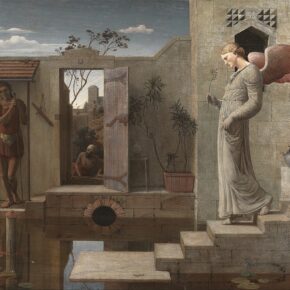
Our exploration of the gracious themes in Avatar: The Last Airbender comes to a close today. To start at the beginning of this seven-part series, go here.
One of Mockingbird’s favorite cultural artifacts is the profound play by Thornton Wilder “The Angel that Troubled the Waters.” In this short play, Wilder reimagines the scene from John 5 at the famed pool of Bethesda in Jerusalem, which was supposed to have miraculous healing powers when an angel stirred the waters. It was said that the first person to enter the water when it was stirred by the angel would be healed of all their infirmities. Historically, many of the invalids in Jerusalem sat by the pool awaiting their healing, which rarely or never came, and Jesus made a point of healing a paralytic by the pool to prove his divinely appointed authority.
 Wilder’s play imagines the daily scene by the pool, where a hoard of the paralyzed and sick and broken fight to be the next one restored by these waters. But Wilder also imagines that a doctor arrives at the pool, crushed in his spirit by guilt, shame, and a host of other mental and emotional wounds. He too comes to sit at the pool, hoping to be healed in his heart instead of healing a bodily infirmity.
Wilder’s play imagines the daily scene by the pool, where a hoard of the paralyzed and sick and broken fight to be the next one restored by these waters. But Wilder also imagines that a doctor arrives at the pool, crushed in his spirit by guilt, shame, and a host of other mental and emotional wounds. He too comes to sit at the pool, hoping to be healed in his heart instead of healing a bodily infirmity.
While the whole play is worth your consideration, the climax of the play is the angel appearing to the physician, asking him to withdraw.
Without your wound where would your power be? It is your very remorse that makes your low voice tremble into the hearts of men. The very angels themselves cannot persuade the wretched and blundering children on earth as can one human being broken on the wheels of living. In love’s service only the wounded soldiers can serve. Draw back.
The physician is unaware that his deep emotional pain, his guilt and shame and the host of other more existentially impactful wounds, are responsible for making him an effective physician. Indeed, at the play’s end, the doctor is asked to visit and bring healing to those who have similarly been “broken on the wheels of living.” There’s something about our suffering, says Wilder, that can bring healing to others. That is, of course, the heart of what happens at Jesus’s death and resurrection.
Our series outlining the gracious themes in Avatar: The Last Airbender is now at a close, and I think the angel’s prescient words to the physician in Wilder’s play encapsulate the overall theme of the show. In love’s service, only the wounded soldiers can serve. The show is a remarkable piece of storytelling that highlights how love, suffering, and grace to sinners have immense and underrated power.
That’s what I hope to communicate throughout the series about each of our principle characters.
- The precondition for Katara to embody the strength of the maternal ideal is the loss of her own mother at the hands of the Fire Nation.
- Sokka’s journey into the masculine ideal begins when the war forces his father to leave home and become a soldier.
- Aang’s redemptive quest to distinguish the child-like from the childish begins after a childish tantrum leads to the near-extinction of his whole race.
- Toph’s blindness opens up the path for her to learn metalbending.
- Zuko’s scar on his left eye is his daily visual reminder of how wicked the Fire Nation and its ideals can truly be.
- The death of Iroh’s son creates the spiritual and psychological heritage that saves Zuko from a life of tyranny.
It’s not just that the great wounds of these heroes are the inspiration for their journeys. They become the source of their power. Without your wound where would your power be? Each character plumbs the depths of those wounds. There is willingness to explore their attendant grief, and the humility to embrace their sadness that drive our characters forward. Ultimately, it is their wounds that become the catalyst for their salvation, and the salvation of the world. The very angels themselves cannot persuade the wretched and blundering children on earth as can one human being broken on the wheels of living.

I started this series with a rumination on the overlap between anime and Christianity, between Japanese history and Western history. Avatar: The Last Airbender is something in the middle, the best of both worlds that doesn’t cleanly fit into either category. I think there’s something remarkable about this TV series, and I hope you, dear reader, give it a shot. If not for yourself, consider it for your school-aged kiddos. You don’t get a seven-part essay serial on a subject if it wasn’t worth writing about.
More than anything, however, I think Avatar presents a Christian vision for the power of suffering and redemption. Watching Zuko’s reunion with Iroh brings tears. Aang’s child-like ability to retain his values and win nonetheless is profoundly cathartic. Sokka’s sarcasm, even if it’s rated Y-7, still makes me smile. And Katara’s growth into the maternal ideal makes me want to be brave. I haven’t experienced this deep level of connection in the fantasy realm since reading The Lord of the Rings or The Chronicles of Narnia. I hope your experience is the same.

COMMENTS
Leave a Reply












